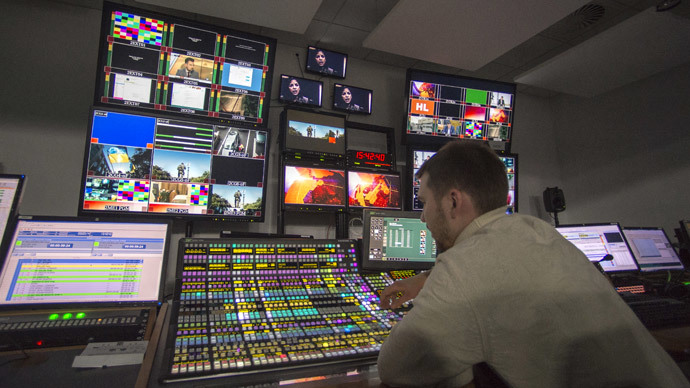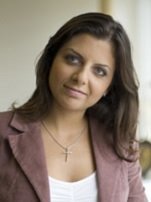Once upon a TIME

Once upon a time – last October, to be precise – I gave an interview to a TIME magazine correspondent for the publication’s in-depth profile on RT. Late last week that piece finally appeared on America’s newsstands.
The opus is a case study of RT-centered writing, which over the last year or so has blossomed into its own cottage industry: full of half-truths, half-quotes and full-on commitment to fitting your subject into an existing narrative box, rather than an attempt to understand or discover anything new.
In an effort to give the article a sense of timeliness, the author uses the backdrop of Boris Nemtsov’s murder to frame the RT story. How did RT treat this tragic, headline-grabbing event that reverberated around the world, and the tens of thousands-strong Moscow march that followed it? According to TIME: “On March 1, when a massive march began in Moscow to protest Nemtsov’s murder – with many carrying signs that read propaganda kills – RT was showing a documentary about American racism and xenophobia.”
Would you like to know what TIME was writing about on March 1? It was comparing the merits of two new models of the Samsung smartphone. A poignant story indeed!

If this example seems like an attempt to purposefully mislead the audience about the quality of TIME’s journalism, it’s because it is. But it’s the same as TIME’s deliberate avoidance of the fact that the Nemtsov mourning rally was the lead story on RT’s March 1 hourly news bulletins from 8am till midnight, with live updates published across our websites and social media platforms throughout the day.
If the introductory presentation of RT is based on brazen omissions, then the next part is a classic example of misdirection, and concerns every mainstream media hound’s favorite bone – RT’s financing. Now, I can empathize with the challenge of trying to write an honest-to-goodness sad-sack story about the outspent (and new favorite epithet, 'outgunned') Western media at a time when RT is broadcasting multiple 24/7 TV channels around the world for the mind-blowing sum of $225 million, while the UK’s BBC World Service and the US’ Broadcasting Board of Governors (BBG, which includes Voice of America and Radio Free Europe) – both running predominantly online and radio services with small and sporadic television presences in a handful of regions – receive $375 million and $721 million respectively.
But TIME certainly gets an A for effort. First, this stateside magazine with a largely US audience pretends that American government-funded BBG doesn’t exist. Then, it compares the financing of RT to the BBC World Service (with the BBC correctly coming out as more generously subsidized, even though TIME uses RT’s obsolete budget figure to narrow the gap), but pivots to a qualifier: “The BBC’s International Service is the biggest broadcast newsgathering operation in the world.”
To achieve this kind of status on such a relatively conservative budget would be remarkable indeed – if only it were true. The problem is that BBC’s “International Service” isn’t a thing in and of itself. It is the newsgathering department of BBC News (budget - $530 million), which is part of the British Broadcasting Corporation (budget – over $7 billion), funded through the license fee that is charged to every UK household with a TV.
This department feeds a substantial part of the content of BBC World News, the UK’s global news channel and RT’s closest counterpart. Formally, BBC World News is set up as a private entity (it is owned by BBC Global News Ltd, the commercial arm of the BBC) and its budget is unknown. BBC News also lends its resources (from newsgathering to the newsroom space) to the BBC World Service (that’s the mostly radio and online service with a $375-million budget that TIME talks about – also funded through the UK TV license). If by now all those structural and budgetary cross-overs seem a little murky, it’s because they are. TIME is obviously counting on its readers to gloss over the details.
So TIME laments: “What is the West to do in the face of a form of richly endowed propaganda?” Yes, what IS the West – with its BBG, BBC News/World News/World Service, CNN International (that has never contradicted a State Department position), Deutsche Welle, France 24, Euronews, and countless newspapers and magazines (including TIME) read around the world – to do in the face of RT and its $225 million? Poor dears!
But the pièce de résistance of the article is my actual interview. Back in October, the TIME correspondent and I spoke in my offices for an hour-and-a-half. This discussion is reduced to some 60 words (in an essay of 2,800) spread across five quotes, plus there is one more quote from our London correspondent. So much for the “inside” look at RT, touted in the headline.
One of the quotes is from our discussion of what makes up the Russian point of view, the presentation of which is one of RT’s stated goals. I said that this worldview is “defined by certain principles expressed by the state: by representatives of the Russian state, if you talk to people on the street, if you look at different polls with Russian people as a whole – you will see that one of the important things that we do not like in the existing world order is the desire of Western countries to make unilateral judgments about what is good, what is bad in the countries far removed from them, about which they know very little, and take military actions based on those unilateral judgments.”
This is what is left of this quote in print: the worldview is “defined by certain principles expressed by the state, by representatives of the Russian state.” Notice a difference? Of the constituencies that are part of the Russian state and define its views, goals and grievances only state representatives make the cut. The opinion of the Russian people is irrelevant. A decade ago I might have been surprised.

By the way, sometimes those representatives call me on my “old yellow telephone” – in plain sight in my office where I give most of the interviews – “to discuss secret things.” What kinds of secret things? Mostly budgets (seeing as RT is publicly funded) and the president’s travel details to coordinate the work of our pool reporters. I said as much to the TIME reporter. Of course, only the conspiratorial-sounding “secret things” comment made the cut. Again, in the good old days I expected higher standards from the Western press…
There are also smaller, funnier fact- and bias-fails that have crept into the piece, like the detail that I gave my interview in the office just across the river from the Kremlin (did we move and I hadn’t noticed? At least someone remembered to pack the phone).
Or that in 2002 I “got a job as a reporter for state TV in Moscow, assigned to the Kremlin pool” – never mind that I’ve already been with the same employer for years, heading up the channel’s regional bureau and continuing my work as a war reporter, which started in 1999 in Chechnya, then took me to Abkhazia in 2001 and Beslan, North Ossetia in 2004.
(Side note: does TIME have a quota for how often Kremlin must be mentioned in an article about RT?)
Or that the “propaganda war” that the West is ostensibly losing is desperately “one-sided” (except for the headlines screaming about Russia’s “Uncontrolled Violence,” “Putin’s Missile”, “The Fascist in the Kremlin,” or how “Russia Wants to Restore Soviet Union”).
But if I had to nit-pick every piece of nonsense said or written about RT, I’d have no time left to run “Putin’s on-air machine.”
The statements, views and opinions expressed in this column are solely those of the author and do not necessarily represent those of RT.
The statements, views and opinions expressed in this column are solely those of the author and do not necessarily represent those of RT.













